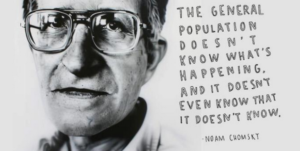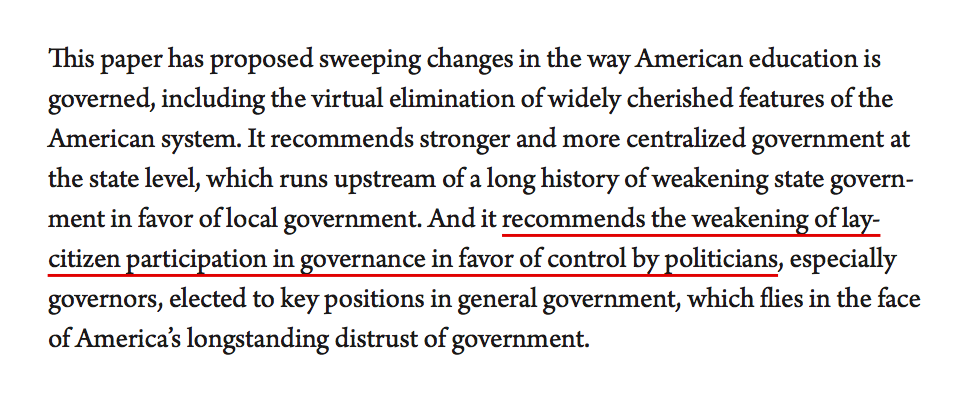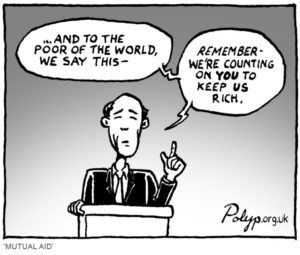 The term “neoliberalism” is not in my old college dictionary. And most people I’ve asked don’t know what it is. For that reason, the public is not able to recognize the ideology behind many of our public policies. …
The term “neoliberalism” is not in my old college dictionary. And most people I’ve asked don’t know what it is. For that reason, the public is not able to recognize the ideology behind many of our public policies. …
We have become victims of sabotage —of our own doing.
We are political pawns in the neoliberal game.
The situation looks daunting. But don’t despair. Shedding light on the neoliberal agenda will enable you to better understand the concept and determine for yourself if you have unknowingly adopted this ideology as your own.
As explained in “Our Neoliberal Nightmare,”
“Everything that promotes the market, i.e., privatization, deregulation, mobility of finance and capital, abandonment of government-provided social welfare, and the reconception of human beings as human capital, [is] encouraged.
It should be said that neoliberalism thrives on prompting crisis after crisis…so that each succeeding crisis only erodes the power of the working class and makes the wealthy wealthier.
[Our] politics succumbs to neoliberal economic theory…[so]… In this revolution of the law, persons have no status compared to corporations…
[And the author writes] I am merely outlining the strength of an opponent that has refused to be named for forty-five years, although it has been the ruling ideology that long!”
Neoliberal beliefs have permeated our social and political structures with bipartisan appeal.
And indoctrination into the neoliberal philosophy runs the gambit — from political propaganda to training within the public education system. That’s right! We’ve been infiltrated.
John Perella’s dissertation on the National Institute for School Leadership (NISL) enlightened me. I hope it does the same for you.
- Neoliberalism is pro-business and does not view powerful corporate influence as problematic (p15)…
- Neoliberalism is acutely conservative in its economic approach. In fact, neoliberals share many of the same educational goals of neo-conservatives. (See The Politics of Reform for definitions.)
- Neoliberalism is about restructuring society to allow for, and facilitate the growth of, free-markets (p16). [See “free-market” discussion in the comments below.]
- Simply put, neoliberalism is a belief system and an economic approach. Privatization is just one strategy of this larger movement and globalization is the background for this entire story (p17).
- Some have argued that privatization (and consequently the end of public education), driven by neoliberal education policies is the objective of [the] landmark legislation [No Child Left Behind] (p17).
Don’t be led to believe NCLB is gone.
The newest version of No Child Left Behind (NCLB), the Every Student Succeeds Act (ESSA), continues to harbor the neoliberal education reform agenda.
What’s wrong with the neoliberal philosophy guiding our public education system?
Children. It’s creating problems for children, which in turn creates problems for families. And in dysfunctional families, the problems are magnified.
We know children need a supportive social structure.
Proponents and critics alike of privatization have identified social cohesion as a possible victim of market driven education.
One cannot expect a competitive approach to promote social cohesion (p51).
That concept is what people like New York Times writer David Brooks haven’t figured out. As explained in The Common Good & Education, he understands that children need a strong social fabric. But he doesn’t see how neoliberal / neoconservative education reform laws damage the social fabric he claims is essential.
Here’s how. Different —more or less— and “higher” standards led to the perceived need for more standardized assessments. More standardized assessments fed the theory of competition. Test scores stirred the public to call for accountability.
When no accountability was forthcoming, “choice” was offered. Choice nourished the market. And the technology to run this whole ruse brought the neoliberal agenda full circle.
Money is being made at every step of the way. Reform? Not so much.
The neoliberal philosophy has us believing that there is nothing wrong with private industry taking over work traditionally done by public institutions…You know the sell… cutting through the bureaucracy, ending the government monopoly on education, and all that jazz… But, answer this…
What is the problem with NISL — Marc Tucker’s for-profit, non-collegiate, privately controlled organization — training/educating/indoctrinating (your choice) OUR public education leadership?
- NISL is not understood by its participants and has not been sufficiently examined by the public (p136).
- Schools are not neutral conveyors of knowledge but are instruments of ideology (p28).
- Since public education is an instrument of ideology, then leaders trained by NISL will predictably influence their respective schools or districts (p29).
- NISL will inevitably apply increased sway on public education as more school leaders are trained (p22).
- Pragmatically, NISL seems to always have one eye on state and federal policies. When it was created, there was a clear alignment in NISL with the spirit of NCLB (pg94).
- The NISL leadership in Washington envisioned the future of the program to include many new initiatives that would “drive NISL deep” (RH). These included cohort coaching and mentoring, new leadership curriculum in early child learning, special education, ELL and disability, as well as pipelining (p99).
And please keep in mind, neoliberal thinking takes the social justice ideal and uses the platform to justify the market-based theory. It draws in liberal thinkers and civil rights groups trying to do what is right for society — unknowingly putting children at the mercy of the almighty dollar.
And never mind how you and I define social justice. Neoliberal leadership proceeds to act by whatever means they desire —pocketing public dollars in the process—and always producing more human capital to do their work.
As Dr. Perella explained NISL’s program, the leadership “education” combines military and business training practices. Pipelining is how the military routinely picks and develops their leadership. And Marc Tucker’s NISL (with his parent organization National Center on Education and the Economy – NCEE) isn’t the only show in town.
“The Broad Academy is a subsidiary of the same Broad Foundation that has [financially] supported NISL. Broad has two distinct flagship initiatives, a residency program for placing “participants into full-time high-level managerial positions in school districts, CMOs (Charter Management Organizations), and federal/state departments of education” (http://broadresidency.org/about/overview.html)
… at the risk of interrupting your reading, let me stop you right here…. Did that last point wake you up? Placement in federal and state “departments of education.” Targeted, strategic placement in our governing structure…just checking that this bombshell hit you…. Okay, so, there is the Broad residency program…
and their Superintendent Academy. The primary goal of the Academy is to train and place non-educator executives into superintendent positions.
In 2009, 43 percent of all large urban superintendent openings were filled by Broad Academy graduates (p58).
So between just these two neoliberal buddies, they have covered the training of urban district superintendents, U.S. Department of Education employees, many State Department of Education hires, and principal training in at least 15 states — all indoctrinated (my choice of words) into the neoliberal doctrine.
I’ll ask again, what is the problem?
Well, I agree with Dr. Perella…
Tucker truly is the man behind the curtain. [And] NISL is but one component of Tucker’s influence on public education reform (p138).
…there is very little ‘public’ in NISL’s design for the training of public school leaders (p137).
And we must always remember,
Central to the neoliberal doctrine is a simple, yet powerful objective: profit (p40).
So with much appreciation for Dr. Perella’s diligent work in answering some very important questions, let me end with some words from the man behind the curtain…from page 50 of Tucker’s publication “Governing American Education: Why This Dry Subject Might Hold the Key to Advances in American Education”… 
Stoppable? Well, we do have a choice. But the question is, do people want to hear it?
And will people consider answering a few questions, like these:
Who should be holding the key to our future?
Are we going to let our public education system go the way of neoliberalism?
If we do nothing, we know how this story goes. History tells us.
################################################################
Note: The pdf provided here for Dr. Perrella’s dissertation concerning NISL is my personal copy. I provided my highlighted and underlined copy not to influence readers with what I found important or interesting but as a courtesy to those who might need to skim, rather than read, the 172 pages.
A clean copy can be found here.



Very nice article. I have one nit with your use of the term “free market”. What neoliberals and neoconservatives alike promote are coerced or crony markets. They form public private partnerships where government and corporations work hand in hand partnerships to violate our rights and actually provide us with less market choice. A truly free market is one based on voluntary exchange where both parties feel they are profiting by the exchange of goods and services. Government leads to distortion in this market by picking winners and losers. So there is deregulation of markets happening, but that deregulation is at the behest of corporate sponsors of neoliberal policies in order to come out ahead. Neoliberals will also hyperregulate a market if their corporate cronies believe it will give them a competitive advantage over smaller operators in the market. The term “free market” has be hijacked and misused in order to make it a bad thing. In reality, a truly free market is one in which everyone wins based on the quality and price of their goods and services.
THANK YOU SO MUCH! Seriously!!! You are right. The term “free market” has been co-opted and corrupted and used to divide us. I appreciate you pointing that out.
Now the trick is going to be coming up with the correct term. We have this same problem with “education reform.” I use the term and it means one thing; “they” use it and it means something totally different.
We must take back the conversation. “A truly free market” “real education reform”…. I’m so glad you commented and I hope others read all the way down…Hum, I’ll see what I can do about that.
This morning I got thinking more about this and wished that my meta-description had read something like “Neoliberalism stands upon a deceptive variety of free-market ideology and justifies profiting from public services in the name of social justice. Their weapon? Public policy. $”
It might actually be too many characters and I don’t know how to change it. But the points you made in defining “free market” clarifies the neoliberal propaganda even further….duped we have been for sure.
I taught elementary school in Virginia for over forty years. After about 25 years the state finally moved to elected school boards. Previously school boards were appointed by the local elected officials. Soon we were constantly being dictated to on matters that had previously been considered best left to teacher’s professional judgment. It was because the elected boards needed to gain recognition. Things deteriorated rapidly followed by A Nation atRisk and you know she rest.
The times definitely did change. I appreciate your perspective from Virginia
My local boards were pressured (still are) into thinking they had to “comply” with federal/state laws and rules. The choice they should have considered is saying “no” to laws and rules that made no sense…..I wonder how much “recognition” they might get for doing so now. Maybe “Elect the Rebel” should become our election slogan next go-around.
Local boards aren’t the silver bullet. We need the system to go back to working – like you point out – based on professionalism. Appreciate the comments and thank you for your public service.
Pingback: How the Democratic Party Became an Enemy of Public Education - The Crucial Voice of the PeopleThe Crucial Voice of the People